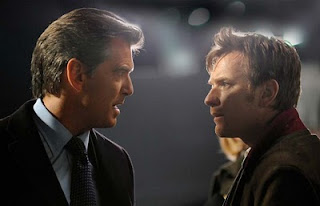 Inevitably, the release of the new Roman Polanski film is going to be overshadowed by the 77 year old director’s ongoing personal troubles. Not that Polanski helps matters entirely by choosing to make a film about an internationally famous figure turned pariah, who is fighting extradition to a foreign court. The director has always jumped from genre to genre; his last film was a version of Dickens’ Oliver Twist for children, before that it was the harrowing holocaust drama The Pianist. Even so, there is a temptation to point out the analogies between the director’s problems and those of his central character. But just because you can draw parallels, it doesn’t mean you should. The Ghost, adapted from Robert Harris’ novel, deserves to be judged on its own merits.
Inevitably, the release of the new Roman Polanski film is going to be overshadowed by the 77 year old director’s ongoing personal troubles. Not that Polanski helps matters entirely by choosing to make a film about an internationally famous figure turned pariah, who is fighting extradition to a foreign court. The director has always jumped from genre to genre; his last film was a version of Dickens’ Oliver Twist for children, before that it was the harrowing holocaust drama The Pianist. Even so, there is a temptation to point out the analogies between the director’s problems and those of his central character. But just because you can draw parallels, it doesn’t mean you should. The Ghost, adapted from Robert Harris’ novel, deserves to be judged on its own merits.Former British Prime Minister Adam Lang (Pierce Brosnan) has written a memoir that his publisher doesn’t want to print. It’s not that it contains sensitive material about how Lang colluded with the Americans to lead Britain into an illegal war in Iraq. They don’t want to print it because it’s a desperately bland collection of family history, airy reminiscences and well-told anecdotes. So the publisher (played by Jim Belishi, for some reason), calls in a ghost writer (Ewan McGregor) and offers him a huge fee to travel to the east coast of the United States and punch it up a bit. The deadline is set for a month.
McGregor’s character, who is only referred to as “the ghost” jumps at the chance to make some quick money, but when he arrived at Lang’s compound he discovers he is not the first writer to attempt the make-over, and his predecessor died in an apparent suicide. The mood in the compound is tense. The suave and superficial Lang (who might as well be called “Phony Flair”) is attempting to put a brave face on his exile, but is terrified at the prospect of being indicted by the International Court of Justice and being dragged to The Hague. His scheming wife Ruth (Olivia Williams) maintains a calm exterior, but she is rattled by suspicions that Lang is having an affair with his officious assistant Amelia (Kim Cattrall).
Soon, the ghost has been drafted in to punch-up press releases and help with the damage control surrounding the PM, as the throng of protesters gather at the gates. The more he digs around in Lang’s past, the more he finds that things do not add up. The more the ghost goes through Lang’s memoir, the more he discovers has been omitted. But the guy that came before must have seen the same connections, and he ended up dead.
From that point on, Polanski smoothly joins the dots on a packed plot with consummate facility, anchored by a fine performance from McGregor. The Scottish actor acts as our point of view, a detective, a writer and a guide, taking the audience through the complications of the story, each twist and turn being as much of a surprise for him as it is for us.
The trouble is that puzzle may solve itself in your head long before the flatly staged chases and confrontations of the third act. Still, with Polanski, it is all about sustaining an atmosphere of paranoid tension and whether it’s an ominous rain-shower, the reaching shadows of a desolate ferry-port or a strange man staring from across a room; The Ghost proves he hasn’t lost his touch.









